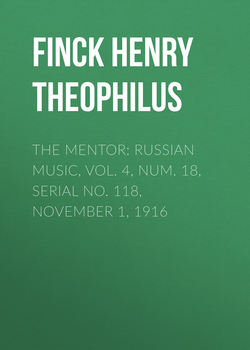Читать книгу The Mentor: Russian Music, Vol. 4, Num. 18, Serial No. 118, November 1, 1916 - Finck Henry Theophilus - Страница 1
Several Natural Questions
ОглавлениеQ. – How big is Russia, and what is its population?
A. – The area of Russia exceeds 8,660,000 square miles, or one-sixth of the whole land surface of the earth. Its population is over 150,000,000 – or at least it was so before the war.
Q. – How many famous Russian composers are there?
A. – Less than a dozen.
Q. – How old is Russian music?
A. – Less than 150 years. Catherine the Great (1761-1796) was one of the first to encourage national music in Russia. Before her time the music performed in Russia was imported, and was largely Italian. Catherine caused productions of music by Russian composers. She supplied the libretto for one opera.
Q. – What is the origin of Russian music?
A. – Both the music and literature of Russia had a common origin – popular inspiration. The form and spirit of the music and literature were drawn from the legends and primitive songs of the people.
Q. – When did music in Russia become, in a real sense, national?
A. – Not until the first part of the nineteenth century. Composers had been trying for fifty years to establish a national movement in music, but it was not until the advent of Glinka and his opera, “A Life for the Czar,” in 1836, that the Russian school of music can be said to have been inaugurated.
Q. – Why were music and literature so late in coming to this great nation?
A. – On account of physical and human conditions. Russia is and has been a vast and absolute monarchy, consisting of millions of people held in subjection and ignorance, and with only a few great centers of civilization. Petrograd has been for years a city of brilliant cultivation, but in contrast to that there are countless towns, villages, and farms in which dwell millions of poor and ignorant people. It is only within the last century that Russia has wakened to a national consciousness and begun to shake off the grim, feudal conditions of the Middle Ages. In this new era the voice of music is first heard as a national expression.
